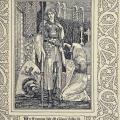424. Hast Any Philosophy In Thee? William Shakespeare
How should we approach Shakespeare’s plays as philosophical texts? We take as examples skepticism and politics in Othello, King Lear, and Julius Caesar.
Themes:
• D. Armitage et al. (eds), Shakespeare and Early Modern Political Thought (Cambridge: 2009).
• C. Bourne and E. Caddick Bourne (eds), The Routledge Companion to Shakespeare and Philosophy (London: 2019).
• G. Bradshaw, Shakespeare’s Skepticism (Ithaca: 1987).
• S. Cavell, Disowning Knowledge in Seven Plays of Shakespeare (Cambridge: 2003).
• L.H. Craig, Of Philosophers and Kings: Political Philosophy in Shakespeare’s Macbeth and King Lear (Toronto: 2001).
• J.D. Cox, Seeming Knowledge: Shakespeare and Skeptical Faith (2007).
• C. Crosbie, Revenge Tragedy and Classical Philosophy on the Early Modern Stage (Edinburgh: 2022).
• J. Dollimore, Radical Tragedy: Religion, Ideology and Power in the Drama of Shakespeare and his Contemporaries (London: 1989).
• L. Gallagher, J. Kearney, and J. Lupton (eds), Entertaining the Idea: Shakespeare, Performance, and Philosophy (Toronto: 2021).
• V. Gerlier, Shakespeare and the Grace of Words: Language, Theology, Metaphysics (New York: 2022).
• P. Gray, Shakespeare and the Fall of the Roman Republic: Selfhood, Stoicism and Civil War (Edinburgh: 2019).
• A. Hadfield, Shakespeare and Republicanism (Cambridge: 2005).
• A. Heller, The Time Is Out of Joint: Shakespeare as Philosopher of History (Lanham: 2002).
• P.A. Kottman, Philosophers on Shakespeare (Stanford: 2009).
• R. Leo, Tragedy as Philosophy in the Reformation World (Oxford: 2019).
• J. Lupton, Thinking With Shakespeare: Essays on Politics and Life (Chicago: 2011).
• J.R. Lupton and D. Sherman (eds), Shakespeare and Virtue: a Handbook (Cambridge: 2023).
• A.D. Nuttall, Shakespeare the Thinker (New Haven: 2007).
• A. Raspa, Shakespeare the Renaissance Humanist: Moral Philosophy and his Plays (New York: 2016).
• A. Schulman, Rethinking Shakespeare’s Political Philosophy: From Lear to Leviathan (Edinburgh: 2014).
• S. Stewart, Shakespeare and Philosophy (London: 2010).
Thanks to Valentin Gerlier and Patrick Gray for advice on this episode!







Comments
Shakespeare and Aquinas
I once attended a lecture by a Jesuit who argues that Shakespeare was familiar with Aquinas, based on a passage in A Winter's Tale where he lists virtues in the same order Aquinas did.
Portrait of Shakespeare
During my junior year of college--the US Bicentennial year of 1976 (well before anti-democracy thugs attacked the US Capitol Building)--I took a Shakespeare course at San Francisco State. The textbook had on its cover the same portrait that you, Peter, used for this episode. I think I still have that textbook. Good memories.
Peter, thanks for all your efforts!
In reply to Portrait of Shakespeare by Spencer
Portrait
Neat! There is a more famous portrait of him but I decided to use this other one because it is just less familiar.
Hooker/ Shakespeare
Disappointing you didn't make up one of your jokes on the lines of,"Two Hookers walked into this Manhatten bar..."
(Apologies if "hooker" is a forebidden word.
In reply to Hooker/ Shakespeare by John Spalding
Hooker
Oh believe me, I considered that, but I decided that it is a "family podcast" and no off color jokes are allowed. Plus, almost too easy? Though that has not exactly stopped me in the past.
Thank You
Dear Peter,
I have been listening to your padcasts for sometime now. I tried to listen to all periods, with gaps of course, to update myself. I listened to all the islamic period. I was able to listen to episode 424 today with great joy.
Living in this difficult period in my country and being a retired engineer who has always loved reading history, literature and philosophy. I have now a new task of listening to your podcasts. I have also started to play an instrument.
Thank you very much a apreciate your efforts very much. “One who does not thank men, will never thank God”.
May I make one point;
On episode 153, Hossein ibn Masour Hallaj (with strees on L), you mentioned about the meaning of the word.. When people took the cotton out of their blanket, it needed to be soften by a Hallaj. He has a big bow like tool, and he would strike the string against the cotton. Vibration of string would cause cotton to soften.
This is still done in some villages in Iran.
I read somwhere that you are now reading Farsi as well. A saying is, When someone wants to explain a matter very fully, he will say:
” بگذار موضوع را کاملا برای تو حلاجی کنم. “
I was wondering what religon you identafy with
I am asking not to be intrusive, just because everyone has a bias and religion is very tied up with philosophy. Even though you have done a good job all things considered at being as unbiased as possible in your presentation. Everyone, even if unconsciously, has a bias, and if possible I would like to be aware of yours if possible. However, I totally understand if you don't want to share that information.
In reply to I was wondering what religon you identafy with by Someone
Religion
Well I have said publicly in other contexts that I'm an atheist, so no harm in saying it again here. I just wasn't raised religious, but as you can tell from the podcast I am interested in religion and its history and have plenty of respect for religious belief and believers. I have noticed that a lot of podcast listeners are theists but also a lot are atheists (like, I can see this in who follows me on social media) so I hope that is a sign I'm striking a good balance.
Shakespeare and rhetoric
Thanks for the focus on Shakespeare! On your characterization of Shakespeare's view on rhetoric as "dangerous", I wonder if we can see it as being more neutral (or even Machiavellian in the non-pejorative sense of the term) if we juxtapose Julius Caesar against the "Stranger's Case" speech in Sir Thomas More. If we accept that Hand D was indeed Shakespeare's, then in that scene the titular character--an officer of the state--successfully and effectively diffuses a xenophobic riot through rhetoric, appealing to both rational self-interest ("how dare you disobey the king/God and cause public disorder?") and emotion ("how would you feel if you were treated like this if you were a refugee?"). In both Julius Caesar and Sir Thomas More, rhetoric is more a tool of statecraft that skilled practitioners use, for good or ill.
(now I'm thinking that that Sir Thomas More speech might be a good mini-case study of Shakespearean Renaissance political theory!)
Scepticism is drama
Shakespeare's interest in the instability of knowledge is not surprising in the light of his profession. Both comedy and tragedy get dramatic oomph from characters 'knowing' incompatible things (the identity of someone, for example, in twin comedies), coming to 'know' something false (Desdemona's infidelity) or doubt something true (Cordelia's love) etc.
In reply to Scepticism is drama by ricketywick
Skepticism and drama
Yes that is definitely right. But I think it is still true that Shakespeare is unusually interested in this among playwrights? Which I would explain in terms of the skeptical turn of European thought around his lifetime.
In reply to Skepticism and drama by Peter Adamson
It’s true about the time of…
It’s true about the time of course, but I’d suggest his particular talent for creating dramatic epistemological dissonances, even among his contemporaries, explains or is explained by (or both) his acute perception of epistemological instability as an issue. He was no philosopher, but he knew a vein of drama gold when he saw one.
Add new comment